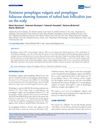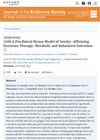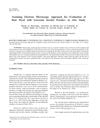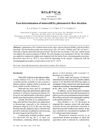 March 2019 in “Nasza Dermatologia Online”
March 2019 in “Nasza Dermatologia Online” A rare scalp condition with hair loss was correctly diagnosed and treated, leading to hair regrowth.
 5 citations,
May 2022 in “Molecules”
5 citations,
May 2022 in “Molecules” Botulinum toxin is effective for various skin conditions, but more research and awareness of side effects are needed.

Topical treatments like minoxidil and corticosteroids are effective for hair loss, with JAK inhibitors promising for alopecia areata.
3 citations,
May 2022 in “Clinical endocrinology” Hair steroid measurement is an effective method to diagnose and monitor CAH in developing countries.
24 citations,
September 2020 in “Pharmaceutics” Lidocaine-loaded microparticles effectively relieve pain and fight bacteria in wounds.
 4 citations,
January 2020 in “Cells”
4 citations,
January 2020 in “Cells” The research found that the gene activity in mouse skin stem cells changes significantly as they age.
 69 citations,
April 2019 in “Biomedicines”
69 citations,
April 2019 in “Biomedicines” PRP and HF-MSCs treatment improves hair growth, thickness, and density in androgenetic alopecia.
 1 citations,
January 2006 in “Elsevier eBooks”
1 citations,
January 2006 in “Elsevier eBooks” Cats lose fur due to various reasons, including allergies, infections, genetics, hormones, diet, cancer, stress, and some conditions are treatable while others are not.
 212 citations,
May 2012 in “Genes & Development”
212 citations,
May 2012 in “Genes & Development” Planarian regeneration begins with a specific gene activation caused by injury, essential for healing and tissue regrowth.
 January 2022 in “Eduvest”
January 2022 in “Eduvest” A teenage girl with a fungal scalp infection got better with antifungal and allergy medication, plus medicated shampoo.
 113 citations,
August 2016 in “Mycopathologia”
113 citations,
August 2016 in “Mycopathologia” New topical antifungals and delivery systems are improving treatment for fungal skin infections, but patient education and prevention are key.
 October 2024 in “Journal of the Endocrine Society”
October 2024 in “Journal of the Endocrine Society” Gender-affirming hormone therapy affects metabolism differently based on treatment type.
 2 citations,
July 2023 in “Frontiers in Endocrinology”
2 citations,
July 2023 in “Frontiers in Endocrinology” The review found that current care models for PCOS are not fully effective and more research is needed, especially in low-income countries.
 June 2023 in “Journal of cosmetic dermatology”
June 2023 in “Journal of cosmetic dermatology” Both DPCP alone and with PRP are effective and safe for treating severe alopecia areata.
 February 2016 in “Journal of urology and nephrology open access”
February 2016 in “Journal of urology and nephrology open access” Finasteride, a drug that prevents testosterone conversion, can effectively reduce blood loss in prostate surgery, especially for patients with a prostatic volume over 30 cc, and decrease post-surgery complications.
61 citations,
March 2006 in “Colloids and surfaces. B, Biointerfaces” Lecithin microemulsion safely delivers tetracaine hydrochloride through the skin.
 18 citations,
March 2015 in “Journal of Endocrinological Investigation”
18 citations,
March 2015 in “Journal of Endocrinological Investigation” The research suggests that the ZP4 gene is linked to egg development in women with PCOS but requires more study to understand its role in infertility.

Androgenetic alopecia, or hair loss, is caused by a mix of genetics, hormones, and environment, where testosterone affects hair growth and causes hair to become smaller and grow for a shorter time.
 8 citations,
November 2019 in “International Journal of Morphology”
8 citations,
November 2019 in “International Journal of Morphology” Henna dye improves hair cuticle and thickness but effects vary by hair type and health.
32 citations,
February 2018 in “Spectrochimica acta. Part A, Molecular and biomolecular spectroscopy” Cosmetic residues on individual hairs can be identified and differentiated using ATR FT-IR microspectroscopy.
32 citations,
September 2018 in “Journal of pharmaceutical sciences” The model better predicts how water-loving and fat-loving substances move through the skin by including tiny pores and hair follicle paths.
 August 2022 in “Journal of Comprehensive Pediatrics”
August 2022 in “Journal of Comprehensive Pediatrics” A girl with a rare genetic disorder had a unique bone condition, highlighting the need for careful diagnosis and suggesting the disorder might be more common than thought.
 13 citations,
September 2005 in “Eclética Química”
13 citations,
September 2005 in “Eclética Química” Quick, accurate minoxidil measurement in hair loss products using photometric flow titration.
35 citations,
October 2005 in “European journal of pharmaceutics and biopharmaceutics” Polymers increased skin permeation and stability of steroid hormones in liposomal formulations.
 2 citations,
January 2021 in “Journal of Cosmetics, Dermatological Sciences and Applications”
2 citations,
January 2021 in “Journal of Cosmetics, Dermatological Sciences and Applications” Olive Mill Wastewater extract could potentially improve hair growth and prevent hair loss.
The extract combination can promote hair growth and act as a natural hair dye.
36 citations,
April 2016 in “Biochimie” A substance called epidermal growth factor helps increase the growth of important hair follicle cells by activating a specific cell communication route.
1 citations,
January 2016 in “Acta histochemica” Black sheep have higher levels of Gnαs and Gnα11 proteins, which may affect their coat color.
 23 citations,
March 2019 in “Journal of Essential Oil Research”
23 citations,
March 2019 in “Journal of Essential Oil Research” Rosemary's antioxidant content changes with the climate and season.
5 citations,
March 2014 in “Indian Journal of Dermatology”




















